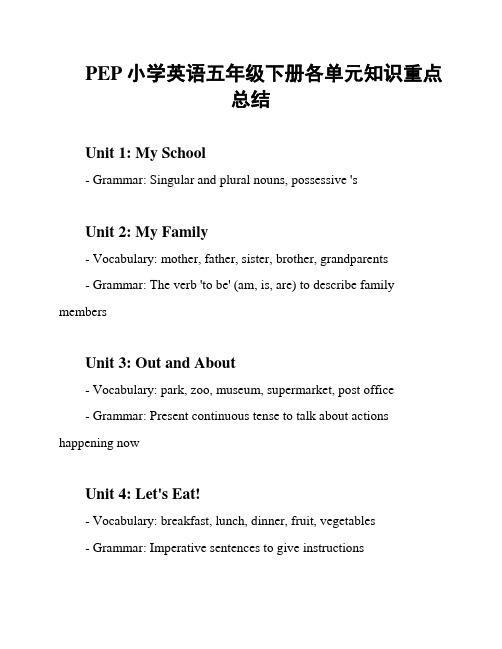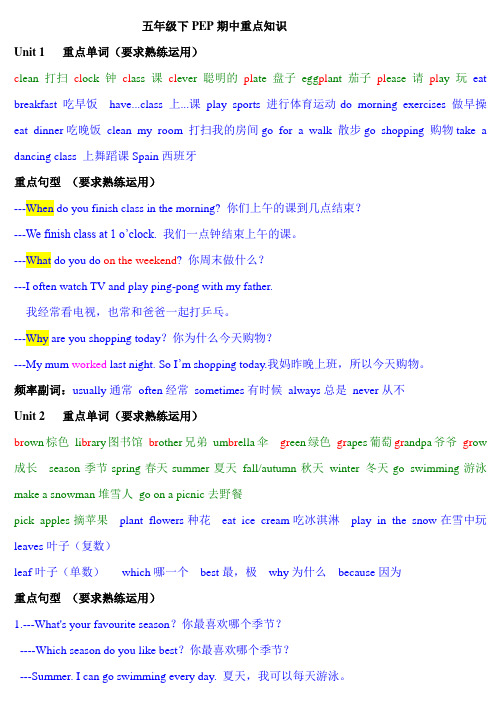新版pep五年级下册英语复习资料
新版PEP五年级英语下册期中复习资料-(6668)

新版 PEP五年级英语下册期末复习资料第一单元一、重点词汇。
eat breakfast吃早餐 have··class 上··课 play sports 进行体育运动 exercise 活动,运动 do morning exercises早锻炼 eat dinner吃晚饭 clean my room 打扫我的房间 go for a walk 散步 go shopping 去购物 take 学习,上(课) dancing 舞蹈 take a dancing class 上舞蹈课a.m.上午p.m.下午usually通常地二、其他日常活动。
get up 起床 eat lunch 吃午饭 go to bed 上床睡觉wash my face洗脸 wash my clothes 洗我的衣服 watch TV 看电视play ping-pong 打乒乓球 play the pipa 弹琵琶 go swimming 去游泳go running 去跑步 do homework 做作业 do kungfu 练武术play football 踢足球 play basketball 打篮球三、语音cl→ [cl] : clean clock class cleverpl→ [pl] : plate eggplant please play注意: cl 和 pl 放在词尾与 e 结合变为 cle 和 ple 时发音不同。
四、频率副词always 总是,一直( 100%) usually 通常( 80%)often 经常( 60%) sometimes( 30%)有时五疑问词why 为什么 when 什么时候六重点句型1、询问别人什么时候做某事的句型及回答。
句型结构:问: When do you+动词短语原形 +其他?(你 /你们什么时候做某事?)答: I/we( +频度副词) +动词短语原形 +at+具体时间(我 /我们通常在几点做某事。
小学英语五年级下册各个单元复习资料

小学英语五年级下册各个单元复习资料第一单元:At the zoo单词复习•lion(狮子)•elephant(大象)•giraffe(长颈鹿)•monkey(猴子)•tiger(老虎)•panda(熊猫)•kangaroo(袋鼠)•snake(蛇)•zebra(斑马)•crocodile(鳄鱼)句子复习1.I see a lion at the zoo.(我在动物园看到一只狮子。
)2.The elephant is big.(这只大象很大。
)3.Look at the giraffe’s long neck.(看看长颈鹿的长脖子。
)4.The monkey can climb trees.(猴子会爬树。
)5.The tiger is sleeping.(老虎在睡觉。
)6.The panda eats bamboo.(熊猫吃竹子。
)7.Kangaroos have long tails.(袋鼠有长尾巴。
)8.The snake is slithering.(蛇在蠕动。
)9.Zebras have black and white stripes.(斑马有黑白相间的条纹。
)10.Be careful, the crocodile is dangerous.(小心,鳄鱼很危险。
)第二单元:In the city单词复习•street(街道)•building(建筑物)•park(公园)•bank(银行)•supermarket(超市)•hospital(医院)•restaurant(餐厅)•museum(博物馆)•library(图书馆)•cinema(电影院)•police station(警察局)句子复习1.I live on a busy street.(我住在一条繁忙的街道上。
)2.The tall building is the post office.(那座高楼是邮局。
)3.Let’s go to the park and play.(我们去公园玩吧。
PEP小学英语五年级下册各单元知识重点总结

PEP小学英语五年级下册各单元知识重点总结Unit 1: My School- Grammar: Singular and plural nouns, possessive 'sUnit 2: My Family- Vocabulary: mother, father, sister, brother, grandparents- Grammar: The verb 'to be' (am, is, are) to describe family membersUnit 3: Out and About- Vocabulary: park, zoo, museum, supermarket, post office- Grammar: Present continuous tense to talk about actions happening nowUnit 4: Let's Eat!- Vocabulary: breakfast, lunch, dinner, fruit, vegetables- Grammar: Imperative sentences to give instructionsUnit 5: At the Farm- Vocabulary: farmer, barn, cow, pig, chicken- Grammar: There is/There are to talk about existenceUnit 6: Our Town- Vocabulary: street, hospital, police station, fire station, city- Grammar: Prepositions of place (in, on, under, behind, next to)Unit 7: Weather Report- Vocabulary: sunny, cloudy, rainy, snowy, windy- Grammar: Adjectives to describe weatherUnit 8: Fun with Friends- Vocabulary: play, sing, dance, swim, draw- Grammar: Simple present tense to talk about daily activitiesUnit 9: In the Ocean- Vocabulary: fish, dolphin, shark, octopus, seahorse- Grammar: Wh- questions using 'What' and 'Where'Unit 10: Happy Holidays- Vocabulary: Christmas, Easter, Halloween, New Year's Day, Thanksgiving- Grammar: Use of can for ability。
PEP小学英语五年级下册期末总复习知识重点及练习

PEP五年级下册期末总复习Unit 1 This Is My Daydo morning exercises晨练eat breakfast吃早饭have english class上英语课play sports进行体育运动eat dinner吃晚饭when什么时候get up起床climb mountains爬山go shopping购物;买东西play the piano弹钢琴visit grandparents看望祖父母go hiking去远足on the weekend 在周末in the morning 在早上in the afternoon 在下午in the evening 在晚上at noon (noon ) 在中午often经常usually 通常;一般sometimes有时候at在……点钟话题:日常生活时态:一般现在时1.When do you do morning exercises? 你什么时候做早操?I usually do morning exercises at 8:00. 我经常八点钟做早操。
I usually get up at 12:00 at noon . 我经常在中午十二点起床。
) 2.When do you eat dinner ? 你什么时候吃晚餐?I eat dinner at 7:00 in the evening. 我在晚上七点种吃晚餐。
3.When is the best time to go to Beijing? Fall. 最好在什么时候去北京?秋天。
语法考点:1.When(什么时候)引导的特殊疑问句,就作息时间进行问答:--- When do you + 行为活动?--- I + 行为活动+ 具体时间。
例:A: When do you eat dinner? B: I eat dinner at 7: 00. .2.What(什么)引导的特殊疑问句,就活动内容进行问答:--- What do you do + 时间?(教材主要是周末)--- I + sometimes / often / usually + 行为活动+ 时间。
新版PEP五年级下英语期中复习归纳

五年级下PEP期中重点知识Unit 1 重点单词(要求熟练运用)c lean 打扫cl ock 钟cl ass 课cl ever聪明的pl ate 盘子egg pl ant 茄子pl ease 请pl ay 玩eat breakfast 吃早饭have...class 上...课play sports 进行体育运动do morning exercises 做早操eat dinner吃晚饭clean my room 打扫我的房间go for a walk 散步go shopping 购物take a dancing class 上舞蹈课Spain西班牙重点句型(要求熟练运用)---When do you finish class in the morning? 你们上午的课到几点结束?---We finish class at 1 o’clock. 我们一点钟结束上午的课。
---What do you do on the weekend? 你周末做什么?---I often watch TV and play ping-pong with my father.我经常看电视,也常和爸爸一起打乒乓。
---Why are you shopping today?你为什么今天购物?---My mum worked last night. So I’m shopping today.我妈昨晚上班,所以今天购物。
频率副词:usually通常often经常sometimes有时候always总是never从不Unit 2 重点单词(要求熟练运用)br own棕色li br ary图书馆br other兄弟um br ella伞gr een绿色gr apes葡萄gr andpa爷爷gr ow 成长season季节spring春天summer夏天fall/autumn秋天winter 冬天go swimming游泳make a snowman堆雪人go on a picnic去野餐pick apples摘苹果plant flowers种花eat ice cream吃冰淇淋play in the snow在雪中玩leaves叶子(复数)leaf叶子(单数)which哪一个best最,极why为什么because因为重点句型(要求熟练运用)1.---What's your favourite season?你最喜欢哪个季节?----Which season do you like best?你最喜欢哪个季节?---Summer. I can go swimming every day. 夏天,我可以每天游泳。
PEP小学英语五年级下册单词句子总复习

PEP小学英语五年级下册单词句子总复习Unit1 this is my dayl 、你能听、说、读、写下面的的单词吗?do morning exercises晨练eat breakfast吃早饭have English class上英语课play sports进行体育活动eat dinner吃晚饭when什么时候evening夜晚,晚上get up 起床at在……点钟usually通常,一般noon中午weekend周末often经常climb mountains爬山go shopping去购物play the piano弹钢琴visit grandparents 探望(外)祖父母go hiking去远足sometimes有时候2、这些难词、难句你都会使用了吗?一When do you do morning exercises?你什么时候晨练?一I usually do morning exercises at 8:30.我通常在8:30晨练。
What do you do on Mondays\S undays…?你星期一/星期日……干什么?I usually\often\sometimes climb mountains.一How about you?= What about you? 你呢?Unit 2 my favourite season1. 你能听、说、读、写下面的的单词吗?spring春天summer夏天fall秋天winter冬天season季节which哪一个best 最;极swim游泳fly kites放风筝skate滑冰;滑冰鞋make a snowman堆雪人plant trees植树why为什么because因为sleep睡觉2.这些难词、难句你都会使用了吗?一What's your favourite season?你最喜欢哪个季节?一Winter.冬天。
--Why do you like summer? 你为什么喜欢夏季?--Because l can swim in the sea.因为我可以在海里游泳。
最新人教pep版小学英语毕业课本知识点单元复习第17课时五年级下册 Unit 5
是你的。
返回目录
4. A: Is he drinking water? 他在喝水吗?
重 B: No, he isn't. He's eating.
不是。他在吃东西。
点 句 5. A: Are these rabbits eating? 这些兔子在吃东西吗?
返回目录
8. eating (eat的-ing形式) (正在)吃 重 9. playing (play的-ing形式) (正在)玩耍 点 单 10. jumping (jump的-ing形式) (正在)跳 词 11. drinking (drink的-ing形式) (正在)喝(水)
12. sleeping (sleep的-ing形式) (正在)睡觉
返回目录
单元整体提升
一、Read and write.写出下列单词的名词性物主代词。
1.my→___m_i_n_e_____
2. your→y_o_u_r_s______
3. his→__h_i_s______ 5. our→__o_u__rs_____
4.her→_h_e_r_s______ 6. their→___th__ei_r_s___
store is ___t_h_e_ir_s___.
5. A: Look! That's my dog.
B: Yes, It's ___y_o_u__r___ dog. The dog is ___y_o_u_r_s___.
6. A: Sam and Peter, wash ____y_o_u_r___ hands.
返回目录
五年级下册英语-Unit1 My day知识点总结复习及练习(含答案) 人教PEP
Unit1 My day知识速递1.重点单词和短语eat breakfast: 吃早饭have…class: 上……课play sports: 进行体育运动exercise: /'eksəsaɪz/ 活动;运动do morning exercise: 做早操eat dinner: 吃晚饭clean my room: 打扫我的房间go for a walk: 散步go shopping: 去买东西;购物take: /teɪk/ 学习;上(课)dancing: /'dɑːnsɪŋ/ 跳舞;舞蹈take a dancing class: 上舞蹈课when: /wen/ 什么时候;何时after: /'ɑːftə/ 在(时间)后start: /stɑːt/ 开始usually: /'juʒuəli/ 通常地;惯常地why: /waɪ/ 为什么always: /'ɔːlweɪz/ 总是;一直busy: /'bɪzɪ/ 忙的need: /niːd/ 需要go swimming: 去游泳win: /wɪn/ 获胜2.语法回顾a. 重点单词:eat breakfast, have…class, play sports, exercise, do morning exercise, eat dinner, clean my room, go for a walk, go shopping, take a dancing class, when, usually, why, always, go swimming, win, need.b. 询问何时做某事:When do you……?例:①When do you get up? (你什么时候起床?)②When do you do morning exercises? (你们什么时候做早操?)③When do they go to school? (他们什么时候去上学?)拓展:When does she eat breakfast?练一练:( ) —When______ you do morning exercises?A. doesB. doC. are( ) —When______ she go to bed?A. doesB. doC. arec. 询问他人周末做什么:What do you do on the weekend?例:①What do you do on the weekend? (你周末做什么?)②What does she do on the weekend? (她周末做什么?)回答:①I usually clean my room. (我通常打扫房间。
新版PEP小学英语五年级下册Unit4单元总复习完整76464ppt课件
12 twelfth 14fourteenth 16 sixteenth 18 eighteenth 20 twentieth
.
3
21twenty – first 22 twenty – second 23 twenty – third 24 twenty – fourth 25 twenty – fifth 26 twenty – sixth 27 twenty – seventh 28 twenty – eighth 29 twenty – ninth 30 thirtieth 31 thirty – first
game
1st 3rd June 4th
July 5th fourth
4th
January 3rd
first
second
third
fifth
February 2nd
5th
August 1st
2nd
.
1
PartA四会单词:
基数词 one two three four five six seven eight nine
on+星期几
2、I get up ___a_t___ 7 o'clock every day.
at+时间点
3、What do you have ___o_n___ Tuesdays?
on+星期几
4、Children's Day is ___o_n___ June 1st.
on+几月几日
5、We usually have a school trip ___i_n___ autumn.
Day?
on + 具体几月几日
.
新版PEP五年级英语下册期末复习知识点归纳
新版PEP五年级英语下册期末复习资料一、重点词汇。
eatbreakfast吃早餐have···class上···课playsports进行体育运动exercise活动,运动domorningexercises早锻炼eatdinner吃晚饭cleanmyroom打扫我的房间goforawalk散步goshopping去购物take学习,上(课)dancing舞蹈takeadancingclass上舞蹈课a.m.上午p.m.下午usually通常地二、其他日常活动。
getup起床eatlunch吃午饭gotobed上床睡觉washmyface洗脸washmyclothes洗我的衣服watchTV看电视playping-pong打乒乓球playthepipa弹琵琶goswimming去游泳gorunning去跑步dohomework做作业dokungfu练武术playfootball踢足球playbasketball打篮球三、语音cl→[cl]:cleanclockclasscleverpl→[pl]:plateeggplantpleaseplay注意:cl和pl放在词尾与e结合变为cle和ple时发音不同。
四、频率副词always总是,一直(100%)usually通常(80%)often经常(60%)sometimes(30%)有时五疑问词why为什么when什么时候六重点句型1、询问别人什么时候做某事的句型及回答。
句型结构:问:Whendoyou+动词短语原形+其他?(你/你们什么时候做某事?)答:I/we(+频度副词)+动词短语原形+at+具体时间(我/我们通常在几点做某事。
)例:Whendoyougotobed(你什么时候上床睡觉?)Igotobedat9:00p.m.(我晚上9点上床睡觉。
)注意:当主语是第三人称单数(he,she,it,单个人名或单数名词)时,助动词do要变成does,句型结构是:whendoes+主语(第三人称单数)+动词短语原形+其他?2、询问别人周末做什么的句型及回答。
- 1、下载文档前请自行甄别文档内容的完整性,平台不提供额外的编辑、内容补充、找答案等附加服务。
- 2、"仅部分预览"的文档,不可在线预览部分如存在完整性等问题,可反馈申请退款(可完整预览的文档不适用该条件!)。
- 3、如文档侵犯您的权益,请联系客服反馈,我们会尽快为您处理(人工客服工作时间:9:00-18:30)。
五年级下册英语期末复习资料姓名:________1、in、on、at的用法区别in用于国家名、城市名、年份、月份、季节前面,如:inSpain;inJune;inwinter on用于星期,几月几号,节日前面,如:onMonday;onMarch10th;onTeachers’Dayat用于具体时间点前面,如:at3:402、workatnight上夜班3、三个“也”的用法区别too用于肯定句末尾;either用于否定句末尾;also用于肯定句中间4、Classesstartat3o’clockThatsoundslikealotoffun YouneedarobottohelpyouWhyareyoushoppingtoday?(★注意以上句子的连词成句,必背)5、begoodat+名词或者动词ing表示擅长于干什么be为is、am、are(is用于单数,are用于you和复数,am只用于I)如:HeisgoodatEnglish.(名词)Theyaregoodatrunning.(动词ing)6、频率副词有always(总是)、usually(通常)、often(经常)、sometimes(有时)、never(从不),频率依次递减。
7、can是情态动词,后面加动词原形,如:Icanswim.(动词原形)8、playwith…..和….玩(注意介词用with)9、Therearefourseasonsinayear.(一年有四个季节)Therearesevendaysinaweek.(一周有七天) Therearetwelvemonthsinayear.(一年有十二个月)spring(March、April、May)summer(June、July、August)autumn(September、October、November)winter(December、January、February)(★以上是基本常识,必须背出记住)10、I’ll=Iwillwe’ll=wewillcan’t=cannotit’s=itis11、fall既可以表示名词秋天也可以表示动词落下,一词多义。
12、like…best=favourite表示最喜欢…如:Whichseasondoyoulikebest?=What’s yourfavouriteseason? Ilikewinterbest.=Myfavouriteseasoniswinter.13、中国与澳大利亚的季节相反China(中国):springsummerautumnwinterAustralia(澳大利亚):autumnwinterspringsummer对应词:spring------autumnsummer-----winter反义词:cool-----warmhot------cold14、Whichseasondoyoulikebest?Lookatmypicture.Springisgreenwithflowersandsongs Summerishotandthedaysarelong Autumnisgoldenandfarmersarebusy.Winteriswhiteandtheyearisgone.Thecoloursareverypretty.Therearebeautifulflowerseverywhere.(★注意以上句子的连词成句,必背)15、wantto加动词原形,如:Iwanttopaintapicture.(动词原形)16、and和,表示并列;but但是,表示转折17、lotsof=alotof许多,后面可以加可数名词或不可数名词afew表示一些,加可数名词;alittle表示一些,加不可数名词。
18、snow(雪)、rain(雨)都是不可数名词,当单数使用19、正确区别特殊疑问词(whatwhenwherewhichwhywhosewho)What表示什么问东西或活动;when表示什么时候问时间Where表示在哪里问地点;which表示哪一个问选择;why表示为什么问原因;whose表示谁的问主人;who表示谁问人20、熟记每月常见的节日:January:(wintervacation-寒假;NewYear’sDay-元旦)February:(wintervacation-寒假)March:(TreePlantingDay-植树节;Women’sDay-妇女节)April:(Easter-复活节:AprilFoolsDay-愚人节)May:(MayDay-劳动节;Mother’sDay-母亲节)June:(Children’sDay-儿童节;Father’sDay-父亲节;DragonBoatFestival-端午节)July:(summervacation-暑假)August:(summervacation-暑假)September:(Teachers’Day-教师节;Mid-AutumnDay-中秋节)October:(China’sNationalDay-国庆节)November:(AmericanThanksgivingDay-感恩节)December:(Christmas-圣诞节)21、lookfor表示寻找lookat表示看22、by表示到。
为止,如:byMarch23rd(到3月23日为止)23、Therebe句型有一个就近原则,紧跟单数名词或不可数名词用is,紧跟复数名词用are24、both表示两者都;all表示三个或三个以上都25、Whatwillyoudoforyourmum?I’llcooknoodlesforherTheymakenoiseswhentheyarehungry.Theystillcan’tseeWehaveafewfunthingsinspring.We’llgototheGreatWallthisyear.WecanhaveabirthdaypartyforbothofyouTherearesomespecialdaysinApril(注意以上句子的连词成句,必背)26、人称代词和物主代词的用法主格(作为主语):Iyousheheitweyouthey宾格(介词\动词后面):meyouherhimitusyouthem形代(后面加名词):myyourherhisitsouryourtheir名代(后面不加名词):mineyourshershisitsoursyourstheirs27、apictureof…的照片,如:apictureofshanghai一张上海的照片amapof….的地图,如:amapofChina一张中国地图28、基数词和序数词的用法基数词(表示数量):one\two\three\four\five\twelve\twenty\thirty序数词(表示顺序):first\second\third\fourth\fifth\twelfth\twentieth\缩略词:1st2nd3rd4th5th12th20th※口诀:有the用序数词,几号用序数缩略词,其他都用基数词29、现在进行时的用法:当出现具体的时间点或单词now、look、listen时就可以判断为现在进行时,表示动作正在进行,结构是be+动词ing;be是is\am\areis用于单数;am只用于I;are用于复数或you;如:HeissleepingIameatingTheyareswimming动词ing的变化规则:◆大多数情况下直接加ing,如:drink—drinking(eat--eating、sleep--sleeping、walk--walking、fly--flying)◆以不发音的字母e结尾的去e加ing,如:write—writing(make--making、take--taking、have--having、dance--dancing)◆重读闭音节时双写最后一个字母再加ing,如:run—running(swim--swimming、shop--shopping、)30、Canyoutakehimtothepark?Theyareplayingwitheachother.Aretheserabbitseating?Theyellowpictureismine.ThereisapictureofShanghai,too.(注意以上句子的连词成句,必背)31、Ilikeflying(此句like表示喜欢的意思,后面加动词ing)I’mrunninglikeatiger(此句like表示像的意思,是一个介词) 32、熟记一些标志语:Keeptotheright靠右Keepyourdeskclean保持桌子干净Talkquietly\Quiet,please请小点声Taketurns按顺序来Workquietly安静学习Noeating禁止吃东西33、speak表示讲,后面加语言,如:speakChinesetalk表示谈论,talkabout+谈论内容;talkto+人say表示说,后面加具体说的内容34、AreyoufromChina?Areyoudoingkungfu?Canyouteachme?Canweplaymusicwithyou?Doyouseeanyelephants?It’splayingwithitsmother.(注意以上句子的连词成句,必背)35、国家名对应国人China—ChineseJapan—JapaneseCanada—CanadianSpain—SpanishAmerica(USA)--American36、语音汇总;cl:cleanclockclassclevercloudyclearclothes(uncle)pl:plateeggplantpleaseplayplayground(people、purple、apple)br:brownlibrarybrotherumbrellabreakfastgr:greengrapesgrandpagrowgrassgreatgrandmach:ChinachickenlunchteacherChinesechildrencheapchocolate(school、Christmas)sh:sheepfishshirtshortsfreshshortth:星期一做运动。
2)WhatdoyouhaveonMonday?你星期一有什么课?IhavemathonMonday.我星期一有数学课。
3)WhatdoyouhaveforlunchonMonday?你星期一中午吃什么?IhavetomatoesonMonday.我星期一吃西红柿。
